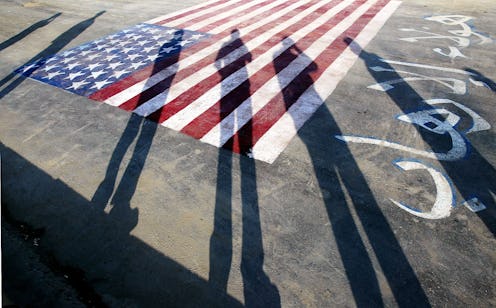News
How "Politicize" Became Such A Dirty Word

In the immediate aftermaths of high-profile, devastating tragedies like the truck attack that happened in New York City this Halloween, or the mass shooting that took place in Las Vegas last month, a familiar dynamic plays out. The left and the right quickly condemn the other's reaction, accusing the other of "politicizing" the issues. But what does "politicization" even mean in a time when every aspect of our lives is affected by politics?
"Unsurprisingly, it’s an unromantic definition," Peter Sokolowski, the editor-at-large of Merriam-Webster, tells Bustle. To politicize means "to give a political tone or character to," and to Solokowski, "That strikes me as being very close to saying 'politicizing a tragedy,' as in, you’re deliberately making it a partisan political issue rather than whatever news story it might be."
In the aftermath of acts of mass gun violence, the anti-politicization takes usually arrive quickly and forcefully, especially from pro-gun conservatives and their advocacy groups. After the mass shooting in Las Vegas, which killed 58 people and injured a staggering 546 more, Democrats called for more gun control. The National Rifle Association's vice president, Wayne LaPierre, criticized efforts to "politicize" the events.
The other side has been so outright trying to politicize this tragedy that we did feel the need to speak out today on this whole bump stock issue.
And after the terror attack in New York City, in which Trump and other Republicans immediately called for immigration reform and brought up ISIS before anything was confirmed, Democratic Mayor Bill de Blasio warned people against politicizing the situation, making discriminatory policies, or start blanket blaming a religion.
The last thing the president or anyone else should do is politicize this tragedy.
So when the right and left alike "politicize" a situation, but the left and the right also criticize each other for doing it, is it fair to say they're using the term correctly? Sokolowski says the way it's often used in reference to public tragedies or disasters is essentially spot-on with Merriam-Webster's most recent definition.
"It seems like it’s being used pretty justly," Sokolowski says.
But it turns out that "politicize" didn't always have the negative connotation that it holds now. There is actually an older, more neutral definition of the word, one that appears in Merriam-Webster's massive unabridged dictionary that was printed in 1934. In that edition, Merriam-Webster defined "politicize as merely "to discuss or take part in politics."
In Sokolowski's eyes, the old definition is rarely — if ever — used anymore, saying it's the "neutral sense, which I think has completely disappeared." But it's worth noting for anyone who wants to make the case for "politicizing" an issue without exploiting or taking advantage of it.
Indeed, the unabridged dictionary also lists "to discuss or discourse upon politics" as an alternative definition. It's a somewhat calmer definition that doesn't suggest a particular issue is being taken advantage of in a politically partisan manner, but instead means that politics are either being discussed or participated in.
However, that simpler definition is out of common usage, and seems to have been for a long time. As Jennifer Szalai pointed out for The New York Times Magazine, the word "politicize" had a negative meaning even back in World War II, as Nazi generals claimed Adolf Hitler had "politicized" the German army. But Szalai also revealed that "politicize" was used in what could be seen as a positive way, noting that The New York Times once wrote that feminists were trying to "politicize" rape and demand change in the legal system
As Sokolowski says, politicize essentially means to turn something into a partisan issue. And barring some sort of movement to start adopting the old, neutral form, it's likely to stay that way.
Although there might be an agreement on what the word "politicize" means right now, there is wild disagreement about the appropriate response to high-profile tragedies. Whether it's gun control or immigration reform, both sides often fall back on the "don't politicize a tragedy" trope to make their case. But from the sounds of things, they're at least using the word appropriately.